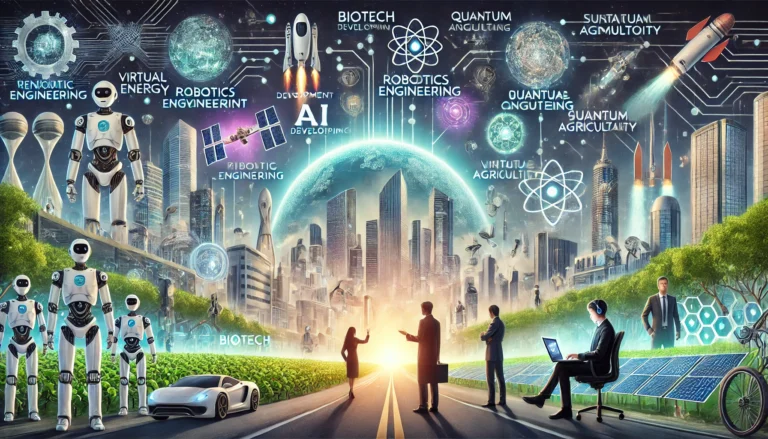Most Valuable Skills for Future Growth: What to Focus on in 2024
10 Must-Have Skills to Actively Develop For Better Growth By 2024
As we experience a technological revolution, the demand and value of different skill sets within our workforce are continuing to fluctuate. As we enter 2024, both individuals and organizations must develop the skills that will not just be essential but also power future prosperity. This extensive post looks into what to learn in 2024 and examines the top skills you should work on based upon current research and trends.
Why Skill Development in 2024 Is Essential
Over the past decade, there have been significant changes that are transforming the global economy, including technological progress, globalization, and demographic shifts. The pace of change in this environment also means that continuous learning and development may be a requirement to keep up with the market or competition. Companies are placing more importance on the need for people with the right balance of technical and soft skills to grapple with today’s greater work environment complexity. For them, investing in skill development is a matter of career resilience, ensuring that they are future-proofed.

The Basis Of Upcoming Workforce: Technical Skills
1. Artificial Intelligence and Machine Learning
As with other sectors in technology, Artificial Intelligence (AI) and Machine Learning (ML) are right at the top of this wave. They have many broad applications, including in healthcare and finance as well as for marketing or customer service. AI & ML professionals who can build intelligent systems for data analysis, decision making, and automation are in immense demand.
Neural nets, NLP, computer vision, and AI ethics are areas of primary importance.
2. Data Science and Analytics
There is a saying that ‘data is the new oil’ and for good reason. Employing a large amount of data analytics is important if you want to make good business decisions because they allow in interpreting and analyzing big bundles of fresh information. Through Insights that Inform Strategy and Enable Innovation The analytics-driven nature of B2B marketing gives data scientists or analysts a central role in uncovering insights.
Common industry trends: Stats, data viz, big data (Hadoop + Spark), and predictions.
3. Cybersecurity
Cybersecurity continues to be a major concern for organizations as they rely increasingly on digital technologies. The increasing incidence and growing sophistication of cyber-attacks require an effective strategy to safeguard sensitive data, resources, applications…
Threat detection and response, ethical hacking, cryptography, and risk management are some of the important areas.
4. Cloud Computing
Today, cloud computing has completely changed the way of doing business by providing a scalable and affordable means for data storage capabilities. With greater numbers of companies migrating to the cloud, we see an increasing demand for professionals with skills in cloud computing.
Main areas of interest: Cloud Architecture, Cloud Security, DevOps, Multi-cloud Management.
5. Blockchain Technology
The technology behind blockchain, introduced to the world through flavors of decentralized cryptocurrencies like Bitcoin and Ethereum is now being used in fields ranging from Supply Chain management (e.g. IBM Hyperledger) to finance or healthcare. Considering its potential to improve transparency and security, it is a skill of the future.
What to work on: Smart contracts, DApps (Decentralized Applications), and blockchain development engines.
Soft Skills: The Emotional Side of a Technocratic World
1. Emotional Intelligence
Emotional Intelligence (EI) as the ability to perceive emotions of both yourself and others, comprehend them, manage those well in communicating with different people. At a time when the workplace is moving towards greater collaboration and communication, EI is increasingly recognized as significant when it comes to forming connections with others, settling disputes more comfortably, or leading people.
Major components of EI: Self-awareness, self-regulation, motivation, empathy, and social skills.
2. Adaptability and Resilience
Given the speed of change that we experience, a skillset with which to become more agile and flexible is necessary! These are the capabilities that allow professionals to deal with ambiguity, get back up from failure, and tackle new challenges in a refocused manner.
How to Build Adaptability & Resilience:
3. Creativity and Innovation
Creativity and Culture are Key in Excellence, Problem-Solving & Progress 1 min read The more your job is based on using creative thinking, the less you are affected by automation taking over routine tasks.
How to Cultivate and Inspire Creativity: Sensory Experience, Curiosity, Brainstorm a go-go.
4. Leadership and Management
Having leadership and manager qualities play a vital role in guiding teams to meet organizational goals. But what will be most needed for the future workforce are people who can inspire, motivate, and handle resources well.
Draft your ideal post-MBA resume? Strategic, decision-making Leader -> delegation and performance Manage with KPIs built by you.
5. Communication Skills
In any interested professional setting, clear and effective communication is crucial. With remote work and global teams more prevalent than ever, communicating ideas and information clearly – whether you are addressing the board of directors or writing a blog post- is critical.
Here are some of the key elements for communication: active listening, public speaking, written and cross-cultural communication.
New 2024+ Skills
1. Sustainable and Green Skills
Across the globe, sustainability is now a top priority for businesses. Organizations will need professionals who are well-versed in sustainable methods and green technologies to decrease their carbon footprint and comply with regulations.
The critical areas of focus: Renewable energy, Sustainable supply chain management, Environmental impact assessment.
2. Remote Work Proficiency
Going forward, the trend to work remotely is expected to surge making expertise in remote working an important asset. This includes the capability to work remotely as part of a team, manage and maintain high-well performing virtual teams, collaborate and remain productive outside a traditional office setting.
Primary tools: Online meeting services, project management software, and well-developed time & digital communication management skills.
3. Digital Marketing
While this may be valid, the increase in digital marketing skills is largely a symptom of an environment where digital platforms are dominating all else. Those who can use social, search, and content marketing combined with data analytics to guide a brand’s overall strategy will be in the most high demand.
Main Areas to concentrate on: Search Engine Optimisation (SEO), Social Media Marketing, Email marketing, and Data-driven marketing.
4. Health and Wellness Expertise
The current global health crisis has further reinforced the necessity of health and wellness. Professionals including those who specialize in health promotion, mental wellbeing, and designing workplace wellness programs will have important roles to play in developing healthier workplaces.
Top Taken Care of Area: Mental health, Diet and nutrition, Body exercise for physical fitness, How to manage stress.
5. Interdisciplinary Knowledge
The future of work will require those who are generalists, meaning possess an interdisciplinary expertise capable to connect the dots across fields. These are all invaluable in roles where you need to have a 50,000 ft view of many areas and work out complicated problems.
How to Embrace Interdisciplinary Learning: Take an array of educational experiences, work on cross-organizational projects, and pursue a curiosity-based learning style.
How to Get Future-Ready Skills
1. Lifelong Learning
There is a need to make the mind switch from thinking about learning being confined strictly to the few years of uni or tafe, it needs to become adopted as an ongoing strategy for today’s ever-changing job market. You can learn to continue through a variety of paths; formal education, online learning specialist courses, attend workshops, or engage in self-directed study.
Lifelong learning tools: Coursera, edX, LinkedIn Learning, and professional certifications as resources.
2. Networking and Mentorship
Networking and mentoring provide important connections to new perspectives, advice, and support through challenges and more. This allows readers to keep up with what is happening and the leaders in their industry as well.
How to grow your network: Industry conferences; professional associations, online forums.
3. Practical Experience
The most important thing to improve is hands-on experience. Work experience — through internships, volunteer work, freelance projects, and collaborative initiatives collectively building one’s craft.
Practical Exposure Opportunities: Internships in the industry, hackathons, and open-source projects.
4. Embracing Technology
Tech-savvy is the new Must Have Adopting technology and keeping up-to-date with the new tools and platforms in your particular niche can greatly boost productivity, as well.
Tech to embrace: Collaboration tools (i.e. Slack, Microsoft Teams), project management software (Asana, Trello), and automation tools (Zapier etc.)
5. Personal Development
For a full circle of growth, it is essential to focus on self-improvement. Ultimately it comes down to taking care of yourself physically, mentally, and emotionally – the bases on which professional success is built.
Personal development time management, mindfulness practices, and work-life balance.
Role of Organizations in Skill Development
1. Employee Training Programs
The contribution of the organizations is important to educate and make these skills more advanced with their training programs, workshops, and learning resources. It boosts the performance of individuals, which in turn enables organizational growth.
High-impact training programs, including onboarding training; leadership development and mobility initiatives.
2. Stimulating Idea and Creativity
Encourage Innovation & Creativity. An environment that fosters innovation and creativity promotes diversity of ideas, which is essential in problem-solving. Invest in a culture of experimentation and risk-taking.
Methods to drive innovation: Hackathons, incubation programs for new ideas, and cross-functional teams.
3. Promoting a Learning Culture
A learning culture in any organization is the foundation of constant improvement and adaptability. This means fostering a culture that invites employees to pursue new knowledge, engaging in conversation, and applying the learning on their jobs.
How to build a culture of learning: rewarding and recognizing learners, building communities for better progression through courses or usage of content.
4. Supporting Work-Life Balance
Employers that value work-life balance have happier and more effective workers. A supportive work environment should include flexible working arrangements, personalized wellness programs, and mental health support.
Work-life balance support: Flexible hours, remote work options, and employee assistance programs.
Conclusion
Navigating the changing world of work in 2024 and beyond, two paths converge: accelerating technology innovation together with evolving social norms for how businesses operate. A combination of technical skills, emotional intelligence, and adaptability; and a lifelong pursuit for continuous learning are some of the most important learnings that will have to be mustered by individuals if they hope to rise as part of future job market transitions. Developing these skills will not only advance careers but allow organizations to innovate and compete in an evolving landscape. But you know that by now. Because investing in learning never should have been a rainy day strategy to begin with.







